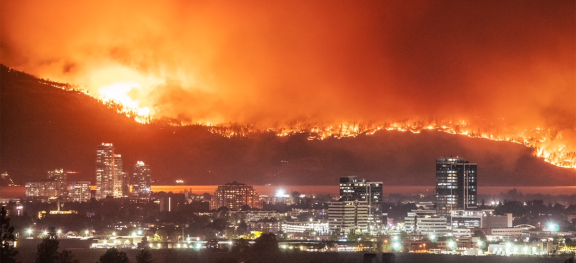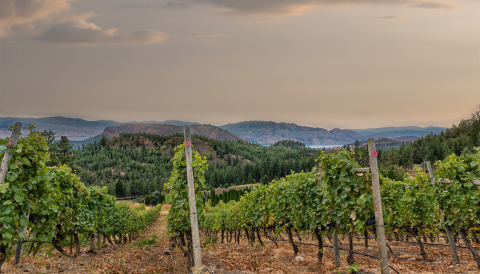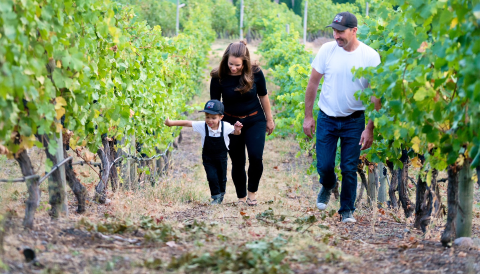Okanagan Valley on fire


British Columbia, in western Canada, has had its worst wildfire season on record, and the latest is threatening Kelowna, in the heart of BC wine country. Kelowna resident, global wine consultant and writer Arnica Rowan reports. Above, a photo by Rob Moses, looking over downtown Kelowna and across Okanagan Lake last Friday. Later that night, the hill that Moses was standing on caught fire and is currently evacuated.
'I opened the door and saw a wall of flames. The entire mountainside was on fire.'
In Canada's westernmost province, British Columbia (BC), Joanna and James Schlosser co-own a little winery. In the 1970s, James's parents purchased a small acreage perched high on the hills surrounding the Okanagan Valley, and planted grapes among the ponderosa pine trees. In 2019, the younger couple bought into the dream. James brought his Master of Science and grape-growing finesse; Joanna, a masterful marketer who has built the most respected brands in BC, crafted the concept. Small batches, big love. Since, Niche Wine Co has stayed tiny but developed a cult following. The boutique West Kelowna winery is the third Indigenous-owned winery in western Canada (Joanna is a member of the Squamish nation) and the first in BC to offer growler (pitcher) refills in the cellar. And their rosé is freaking delicious.
Two days ago, a forest fire took off on the parched slopes above the Niche vineyards. It tore across the hills, leaping from tree to tree, fuelled by tinder-dry brush and breathtaking winds. Joanna and James were at the winery preparing it for harvest when, at 4.30 pm, a Royal Canadian Mounted Police constable stopped at the gate and told them, their son and James's parents, who live on the West Kelowna property, that it was time to leave. They locked the winery doors and drove down the hill and across the Okanagan Lake bridge to the younger couple's house on the north side of Kelowna. As they fled, Joanna could see the flames snaking rapidly down towards the lake behind them.
Exhausted, the family ordered Chinese takeout, ate, and crawled into bed. The fire, however, didn't rest. Gale-force winds blew embers across the narrowest part of the 135 km (84 mile) long lake, igniting the forest on the other side. In the middle of the night, the couple heard banging on the front door. Groggy, they opened the door and found their frantic neighbour screaming that they had to leave. Over the neighbour's shoulder, they saw it – the wall of flames.
'We had no time to pack, so we just grabbed our son and the dogs, and left', Joanna told me on the phone. 'It was like escaping through a war zone, with heat and fire everywhere.'
Joanna and James are currently sheltering at a friend's ski cabin east of Kelowna. Over the last two days, Joanna has frequently checked the security cameras overlooking the Niche vineyard. At one point, she watched the tall pines along the vineyard edge turning to candles with flames flowing up the branches to the sky above. She thinks the green vineyard might be acting as a firebreak, slowing the progress of the wildfire. She knows their equipment shed is gone, but she still hopes the barrel store is intact.
It's been the worst year for forest fires in British Columbia's recorded history. As I write on our Sunday night there are 341 active fires throughout our province, with 14 of them threatening human life. The largest fire started in early May, far in the north where I grew up. Months later, wildfire is still burning out of control across 5,800 sq km (2,240 sq miles). As of two days ago, 30,000 people have been evacuated across the province, and 35,000 are on alert, ready to leave at a moment's notice.
Ironically, our summer in the Okanagan Valley, where the vast majority of BC wine is produced, has been relatively smoke-free. The first forest fire in the valley crept across the Washington/BC border only at the end of July, igniting Anarchist Mountain and threatening the grape-growing town of Osoyoos south of Okanagan. Thanks to our stellar, experienced firefighting crews, that fire was soon brought under control, but it is still simmering at 7,000 hectares (17,000 acres) above the vineyards and town.
There were no other significant fires in the Okanagan Valley until two days ago, when all hell broke loose. Now we, and almost every grape-growing region in British Columbia, have wildfires running amok.
The West Kelowna fire impacting Niche Wine Co has grown to 11,000 hectares (27,000 acres), prompting the evacuation of 15,000 people, and the closure of wineries from the hills down to the lakeshore. The sparks that ignited the fire outside Joanna and James's door also started a fire in the Lake Country wine region, broaching the vineyards overlooking Okanagan Lake. At this point, the historic Gray Monk winery is still standing, but the fire perimeter is so close that the flames can be seen from the cellar door.
Further north, the Thompson region's 8,000-hectare (20,000-acre) sagebrush-fuelled fire is high above the vineyards along the valley floor. The wild desert vineyards of the Similkameen region are threatened by an out-of-control 41,000-hectare (100,000-acre) bush fire on the other side of a river. The mountain wine region of Lillooet has another fire just down the valley in Lytton, the beleaguered village that burned in 2021. Even the lush, verdant Shuswap region has caught fire. Yesterday, the flames engulfed an additional 20 km (13 miles) in 12 hours, cutting off roads and forcing residents to escape with volunteer motor boats careening from shore to shore. I proactively moved our family two nights ago to the Creston Valley where my parents live. Although it is smoky, the fires remain mercifully on the other side of the mountains. Vancouver Island's temperate rainforest surrounding the Cowichan Valley wine region, and the wet floodplains of the Fraser Valley near Vancouver are far from fire, but also flooded with smoke.
British Columbia's late-summer fires are the second massive climate-related catastrophe this year. Last winter posed its own challenges: temperatures in some growing areas dipped below -30 °C (-22 °F) with cordons snapping and vines dying forever. Prolonged bouts of -20 °C (-4 °F) resulted in significant winter damage to the remaining buds. In my Kelowna backyard vineyard, little buds produced shoots in the spring, but only the vines located beside the warm hot tub produced any fruit. The organisation Winegrowers BC estimated last month that commercial grape growers will have up to 56% crop loss in 2023, another short crop after a streak of low yields from 2019 to 2021. To replace our lost vines, 29% of our vineyard acreage needs to be replanted this year.
After the harsh winter weather, we were finally blessed with sublime growing conditions. The spring was damper and cooler than usual, nourishing the vines; hot early summer weather fuelled optimal growth. James Schlosser commented that the lower cluster count naturally increased concentration in the grapes. James was expecting the quality of the 2023 vintage to be outstanding. Now the question is whether he and Joanna can get to their grapes for harvest at all.
According to the government's ever changing wildfire map, Niche Wine Co seems to be the only vineyard surrounded by flames at this time. There may be more in the Shuswap region, as that fire is growing faster than the online maps can reflect. Regardless, the economic impact on many of BC wineries will be severe.
The Schlossers were expecting a shipment of grapes from Kamloops on Tuesday, but at present, Canada's Number 1 highway route is closed and they have nowhere to process the grapes if they do arrive. 'Farming doesn't take a vacation', Joanna sighed. With evacuated employees and dangerous outdoor conditions (the air-quality index categorises Osoyoos and Kelowna as 'hazardous'), many other grape-growers will also struggle to complete the harvest.
Like most family-owned BC wineries, Niche Wine Co greatly relies on the short season of cellar-door sales and wine-club sign-ups to keep their small business afloat through the year. As the British Columbia government has declared a state of emergency, tourists have been ousted from the entire Okanagan region to provide adequate housing for displaced residents and emergency crew. In 2020, a pandemic-related 79% decrease in wine tourists resulted in a 65% decrease in tourism-sourced winery revenue across the province. I predict this (completely necessary) travel ban for the last four weeks of peak tourism season will result in a pandemic aftershock, erasing a fifth to a quarter of cellar-door revenue for the year.
Summertime is also when wineries replenish their wine-club membership. With an average of 20% of club members dropping off each year, the inability to replenish subscribers may result in a deficit of support for wineries in the coming winter. Finally, short crops compounded by fire-related harvest issues mean a very limited number of bottles will be available for next summer's selling season. Less wine, less revenue. Next year's stresses have already begun.
To support the British Columbia wine industry through this chain of catastrophes, I encourage Canadians to order directly from a BC winery website and have a case of wine shipped to their door. To have a deeper impact, please sign up for a wine-club membership and spread your drinking pleasure and billing across the year.
When I spoke to Joanna, she was reluctant to request any personal help and suggested that drinking BC wine from any producer would be appreciated. However, I happen to know that Niche Wine Co has super-cute sweatshirts, and ships internationally. If you fancy a 'Pinot Please', 'Hello Merlot' or the more esoteric 'Foch Fever' crew neck, consider ordering one from their online shop.
Joanna also extended her characteristic hospitality, inviting the world's wine lovers to visit British Columbia next year, once the weather settles down. 'Mark 2024 as the year you come to BC – we will all be back. We can't wait to see you, and we'll be ready with some delicious wine.'
Become a member to view this article and thousands more!
- 15,411 featured articles
- 275,117 wine reviews
- Maps from The World Atlas of Wine, 8th edition (RRP £50)
- The Oxford Companion to Wine, 5th edition (RRP £50)
- Members’ forum
- 15,411 featured articles
- 275,117 wine reviews
- Maps from The World Atlas of Wine, 8th edition (RRP £50)
- The Oxford Companion to Wine, 5th edition (RRP £50)
- Members’ forum
- 48-hour preview of all scheduled articles
- Commercial use of our wine reviews

